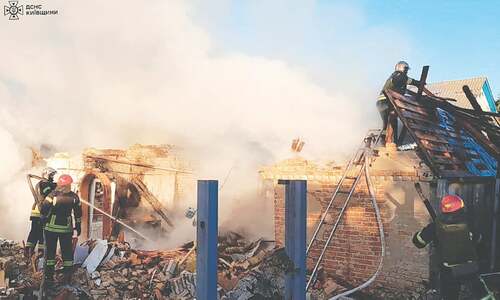SANTIAGO, Nov 20: Asia-Pacific leaders opened an annual summit here on Saturday, immersed in US President George Bush's "war on terror" agenda and in the shadow of the suspected nuclear ambitions of North Korea and Iran.
Heads of the 21-member Asia-Pacific Economic Cooperation (APEC) forum began formal discussions in a heavily guarded, brick-and-glass conference centre in Santiago by the foothills of the snow-capped Andes.
Violent clashes between rock-throwing demonstrators and anti-riot police firing tear gas and water cannon erupted the previous day. By the early hours of Saturday, three people had suffered bullet wounds and 250 were detained.
Preparations for the talks, which wrap up on Sunday with an informal "retreat" in the neoclassical La Moneda palace of Santiago, have been dominated by fear over nuclear proliferation and by the anti-terrorism campaign.
Mr Bush warned Iran over reports it has accelerated production of uranium material that could be used to make nuclear weapons, and vowed to unite Asia-Pacific allies in pressing North Korea to abandon an admitted nuclear weapons program.
In a rush of meetings with fellow leaders before the summit, Mr Bush also tried to wrench the Asia-Pacific alliance together against Pyongyang's nuclear weapons scheme.
"The leader of North Korea will hear a common voice," he promised.
Mr Bush met with Japanese Prime Minister Junichiro Koizumi, Chinese President Hu Jintao, South Korean President Roh Moo-Hyun and Russian President Vladimir Putin, all partners in six-party talks with Pyongyang.
"What's very important is for the leader of North Korea to understand that the six-party talks will be the framework in which we continue to discuss the mutual goal we all have, which is to rid the Korean Peninsula of nuclear weapons," he said.
Washington hopes to pull Pyongyang back to the negotiations as early as possible, perhaps as early as this year, but more likely in early 2005, according to a senior administration official.
North Korea, which revealed it had a nuclear weapons program two years ago, boycotted the latest round of talks in September.
Anti-terrorism measures are bound to be central at the Apec summit talks.
Apec foreign ministers, including outgoing US Secretary of State Colin Powell, set the tone for the leaders, agreeing to keep closer tabs on shoulder-mounted missile launchers, which could give a terrorist the capacity to down a plane.
FREE TRADE AREA: Leaders are also expected to discuss a business leaders' proposal for the creation of a Free Trade Area of the Asia-Pacific, or FTAAP, embracing the giant trading groups of the Americas and East Asia.
Apec appeared split over the free trade plan.
Australia, Canada, Chile, New Zealand, Singapore, Taiwan and the United States backed it, while others, such as China, Indonesia, Japan and Malaysia, were cautious or opposed it, Apec sources said. -AFP
















































Dear visitor, the comments section is undergoing an overhaul and will return soon.